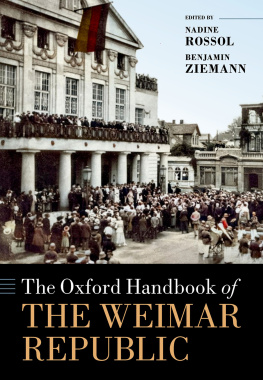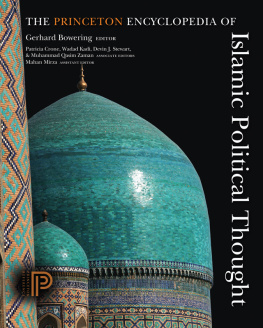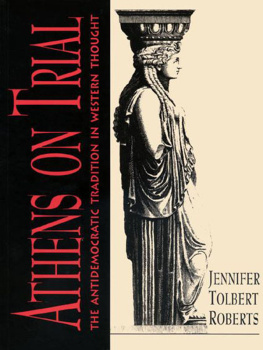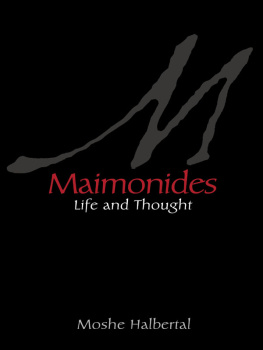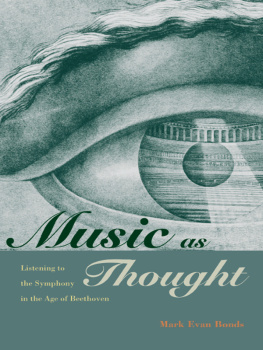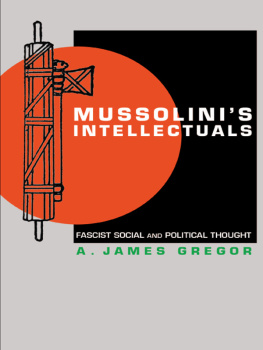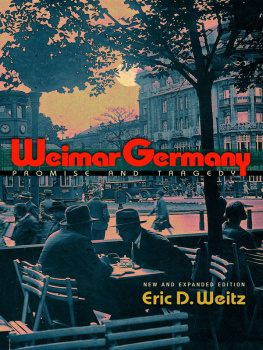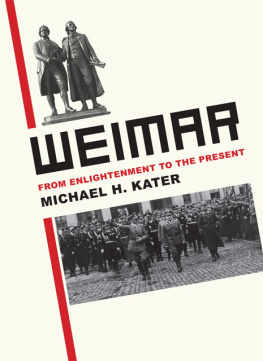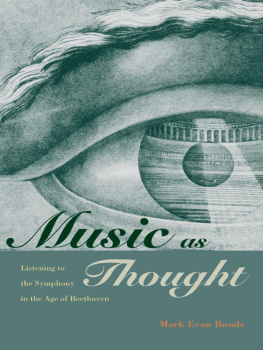Princeton University Press - Weimar Thought
Here you can read online Princeton University Press - Weimar Thought full text of the book (entire story) in english for free. Download pdf and epub, get meaning, cover and reviews about this ebook. genre: Politics. Description of the work, (preface) as well as reviews are available. Best literature library LitArk.com created for fans of good reading and offers a wide selection of genres:
Romance novel
Science fiction
Adventure
Detective
Science
History
Home and family
Prose
Art
Politics
Computer
Non-fiction
Religion
Business
Children
Humor
Choose a favorite category and find really read worthwhile books. Enjoy immersion in the world of imagination, feel the emotions of the characters or learn something new for yourself, make an fascinating discovery.

- Book:Weimar Thought
- Author:
- Genre:
- Rating:5 / 5
- Favourites:Add to favourites
- Your mark:
- 100
- 1
- 2
- 3
- 4
- 5
Weimar Thought: summary, description and annotation
We offer to read an annotation, description, summary or preface (depends on what the author of the book "Weimar Thought" wrote himself). If you haven't found the necessary information about the book — write in the comments, we will try to find it.
Weimar Thought — read online for free the complete book (whole text) full work
Below is the text of the book, divided by pages. System saving the place of the last page read, allows you to conveniently read the book "Weimar Thought" online for free, without having to search again every time where you left off. Put a bookmark, and you can go to the page where you finished reading at any time.
Font size:
Interval:
Bookmark:

Weimar Thought
A Contested Legacy
Edited by Peter E. Gordon and John P. McCormick
PRINCETON UNIVERSITY PRESS
Princeton and Oxford
Copyright 2013 by Princeton University Press
Published by Princeton University Press, 41 William Street,
Princeton, New Jersey 08540
In the United Kingdom: Princeton University Press, 6 Oxford Street,
Woodstock, Oxfordshire OX20 1TW
press.princeton.edu
Cover art: Raoul Hausmann (18861971), The Spirit of Our Age (Mechanical Head) , 1919.
Wooden head with various objects attached to it. 32.5 x 21 x 20 cm. AM 1974-6.
Photo Credit: CNAC/MNAM/Dist. RMN-Grand Palais / Art Resource, NY. ARS, NY.
2013 Artists Rights Society (ARS), New York / ADAGP, Paris
All Rights Reserved
Paperback ISBN 978-0-691-13511-3
The Library of Congress has cataloged the cloth edition of this book as follows
Weimar thought : a contested legacy / Edited by Peter E. Gordon and John P. McCormick.
pages cm
Includes bibliographical references and index.
ISBN 978-0-691-13510-6 (alk. paper) 1. GermanyIntellectual life20th century. 2. GermanyHistory19181933. 3. Social sciencesGermanyHistory20th century. 4. HumanitiesGermanyHistory20th century. 5. Political cultureGermanyHistory20th century. I. Gordon, Peter Eli, editor of compilation II. McCormick, John P., 1966editor of compilation
DD239.W365 2013
943.085dc23
2012038154
British Library Cataloging-in-Publication Data is available
This book has been composed in Minion Pro and Ideal Sans
Printed on acid-free paper.
Printed in the United States of America
Peter E. Gordon and John P. McCormick
David Kettler and Colin Loader
Mitchell G. Ash
John P. McCormick
Dana Villa
John Michael Krois
Frederick Beiser
Charles Bambach
Peter E. Gordon
Cathryn Carson
Michael Jennings
Karin Gunnemann
Martin A. Ruehl
Sabine Hake
John V. Maciuika
Michael P. Steinberg
Suzanne Marchand
Tracie Matysik
Martin Jay
Anson Rabinbach
This volume brings together a broad range of papers on diverse themes pertaining to the intellectual and cultural history of the Weimar Republic. It includes a great variety of contributions by scholars affiliated with manifold disciplines, including, but not limited to, history, political theory, philosophy, sociology, the history of science, film theory, art history, and literary criticism. Our aim has been to provide a critical companion for specialized research that, while adding to current scholarship, would nonetheless remain accessible to the more general reader. Few if any single-volume works have succeeded at offering a unified portrait of the rich developments of Weimar thought, and we believe the time is right to offer a guidebook to the German interwar era, a compendium focused primarily on the major intellectual trends of the time.
What was Weimar thought? To a remarkable degree, much of the literature we now regard as foundational for modern thought derives from a single historical moment: the astonishing cultural and intellectual ferment of interwar Germany circa 191933. The era of the Weimar Republic was arguably the foremost crucible of intellectual innovation in political theory and sociology, cultural criticism and film theory, psychology and legal theory, physics and biology, and modernism in all of its diverse forms. Its brief lifespan saw the emergence of intellectuals, scholars, and critics who rank amongst the foremost thinkers of the twentieth century. A representative list would no doubt include philosophical radicals such as Walter Benjamin, Martin Heidegger, and Max Scheler; theorists of political crisis such as Carl Schmitt, Ernst Jnger, Hannah Arendt, Hans Kelsen, and Oswald Spengler; innovators in theology such as Karl Barth, Franz Rosenzweig, Gershom Scholem, and Ernst Bloch; and exponents of aesthetic rebellion in literature, film, drama, music, and the fine arts, including Alfred Dblin and Siegfried Kracauer, Bertolt Brecht and Ernst Krenek, Hannah Hch and Kurt Schwitters. No doubt the list could well be expanded to far greater length.
Intellectual labors of the era were noteworthy, too, for the way in which they exemplifed a boldness of inquiry that would, in current jargon, be characterized as interdisciplinary. Scholars, critics, and artists frequently cut across the customary boundaries separating philosophy, history, and artistic criticism, political theory and theology, not to mention science and metaphysics. In this respect it might be argued that the leading figures in Weimar thought not only anticipated, but actually helped to found and inspire the ongoing interdisciplinarity of our own day. This is especially obvious when one considers the contemporary actuality of these theorists, whose ideas, even today, continue to enrich academic and cultural discourse within and beyond the university. An intellectual-historical survey of Weimar thought in all its many facets is thus in no small measure a pre-history of our own intellectual present.
On some of these topics much has been written already. Yet the increased specialization of research has all-too-frequently been achieved at the expense of contextual and historical understanding. Scholars have often failed to recognize just how much the leading intellectuals of that time worked within a shared intellectual horizon. Especially in the past twenty years, we have witnessed a terrific burst of dehistoricized theory, a mode of inquiry that plundered the past for its insights but often neglected its historical character and effaced the salient (though by no means insurmountable) differences between past and present.
But the largely ahistorical character of modern theory is now fading, thanks in part to recent innovations in historical and philosophical method, and, perhaps most especially, to the renaissance of intellectual history, a discipline which only twenty years ago seemed in decline. The great efflorescence of intellectual history in the last two decades has helped to break down many of the previously-enforced boundary lines between the humanities and the social sciences. Under the auspices of a new generation of philosophers, political theorists, historians, and literary-cultural critics, scholars have begun to appreciate the fruitful tension between hermeneutic contextualism and transcendental claims to truth. The time is therefore ripe to bring these insights to bear on the theoretical heritage of the Weimar era. A major advantage of this interdisciplinary volume of essays is that it demonstrates both the unity and diversity of this inheritance, and it identifies anew those characteristics that helped to make Weimar a veritable birthplace of European intellectual modernity.
In his synthetic history of the Weimar Republic published over twenty years ago, the German historian Detlev Peukert observed that our present image of Weimar is marked by an irresolvable paradox: it combines the hopeful picture of avant-garde cultural achievement with the bleak picture of political breakdown and social misery. For Peukert this paradox was not only resistant to resolution, it was in point of fact emblematic of classical modernity as such: The tensions of the age were taken to represent the conflicts and crises of the modern era itself. But the governing theme of a classical phase in modern history merely names without wholly explaining the paradox Peukert sought to diagnose. The historians impulse to unify divergent features of a political-cultural epoch is unlikely to prove genuinely satisfying since it derives from the nave and ultimately un historical expectation that every age must somehow subscribe to a common theme. The paradoxical character of the Weimar Republic no longer strikes us as paradoxical once we abandon the retroactive search for a governing logic and open ourselves to the diversity and disunity of narratives within any given historical epoch.
Font size:
Interval:
Bookmark:
Similar books «Weimar Thought»
Look at similar books to Weimar Thought. We have selected literature similar in name and meaning in the hope of providing readers with more options to find new, interesting, not yet read works.
Discussion, reviews of the book Weimar Thought and just readers' own opinions. Leave your comments, write what you think about the work, its meaning or the main characters. Specify what exactly you liked and what you didn't like, and why you think so.

